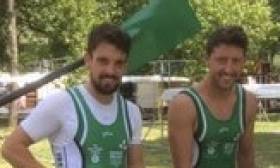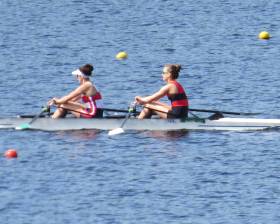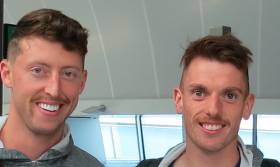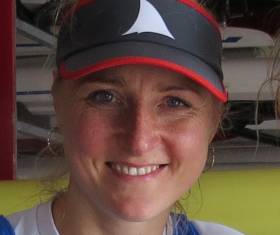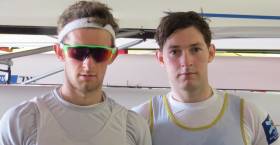Displaying items by tag: O'Donovan
O'Driscoll and O'Donovan Nail Place in Top Twelve at Lucerne
#Rowing: Shane O’Driscoll and Mark O’Donovan took a fine second place behind France One in the quarter-final of the men’s pairs at the World Cup Regatta in Lucerne today and secured their place in the A/B Semi-Finals. The Skibbereen men moved from fourth to second as the race progressed, ensuring that they would stay in the hunt for the top spots in this heavyweight event. The second Ireland pair of Patrick Boomer and Andy Harrington finished sixth in the same quarter-final.
World Cup Regatta, Lucerne, Day One (Irish interest; selected results)
Men
Pair – Heat Two (First Four to Quarter-Final; rest to Quarter-Final or E Final): 1 Spain 6:40.29; 3 Ireland Two (P Boomer, P Harrington) 6:45.74
Heat Six (First Three to Quarter-Final; rest to Quarter-Final or E Final): 1 Croatia 6:37.66, 2 Ireland One (M O’Donovan, S O’Driscoll) 6:40.95. Quarter-Final Two (First Three to A/B Semi-Finals; Fourth to C Final; rest to Final C or D): France One 6:38.22, 2 Ireland One (O’Donovan, O’Driscoll) 6:40.12; 6 Ireland (Boomer, Harrington) 6:54.89
Lightweight Double Sculls – Heat One (First two to A/B Semi-Finals; rest to Repechage): 1 Ireland (G O’Donovan, P O’Donovan) 6:17.43, 2 Austria 6:17.79; 3 Poland 6:17.91.
Single Sculls – Heat One (First Four to Quarter-Final; rest to Quarter-Final or E Final): 1 New Zealand (M Drysdale) 6:52.98; 3 Ireland (P Doyle) 6:55.18.
Women
Pair – Heat Two (First to A Final; rest to Repechage): 1 Canada 7:13.98; 6 Ireland (A Keogh, T Hanlon) 7:32.49.
Double Sculls – Heat Two (First Three to A/B Semi-Finals; rest to Repechages): 1 United States 6:58.58, 2 Ireland (A Crowley, M Dukarska) 7:03.05.
Single Sculls – Heat One (First to A/B Semi-Final; rest to Repechages): 1 Ireland (S Puspure) 7:26.51; 2 United States 7:40.98.
O'Donovans Tested by Skibbereen Twins at Cork Regatta
#Rowing: Paul O’Donovan and Gary O’Donovan were tested in the men’s double sculls by Jake and Fintan McCarthy at Cork Regatta today. The two Skibbereen crews fought it out down the course with the twins not letting the O’Donovan brothers build a clear-water lead. At the end the McCarthy’s pushed, and there was less than a length in it.
UCD’s four were impressive winners. The crew of Shane O’Connell, Andrew Goff, Shane Mulvaney and David O’Malley left Commercial behind.
The Skibbereen/Lee combination of Denise Walsh and Margaret Cremen were also in charge in the women’s double. Behind them the junior double from Workmen’s won a battle for second.
Cork Regatta, Day Two (Selected Results)
Men
Four – Div One: 1 UCD (S O’Connell, A Goff, S Mulvaney, D O’Malley; sen) 6:33.45, 2 Commercial (sen) 6:38.28, 3 Shandon (sen) 6:46.05. Four, coxed – Div Two: 1 UCC (club two) 7:00.73; 6 St Joseph’s 7:19.29. C Final: 3 St Michael’s (jun 16) 7:40.34.
Sculling, Double – Div One: 1 Skibbereen A (G O’Donovan, P O’Donovan; sen) 6:46.14, 2 Skibbereen B (sen) 6:47.68; 4 Queen’s (inter) 7:15.57. B Final: Castleconnell (jun 18A) 7:19.86. C Final: 5 Belfast RC (club one) 7:57.44.
Single – Div Two: 1 Kenmare (T Kelly; jun 16) 8:01.71, 2 New Ross (jun 18B) 8:03.67, 3 Workmen’s (club two) 8:04.995.
Women
Sculling, Double – Div One: 1 Skibbereen, Lee (M Cremen, D Walsh; sen) 7:42.97, 2 Workmen’s (jun 18A) 7:56.34, 3 Fermoy (inter) 7:57.45. B Final: 4 Fermoy Castleconnell (club one) 8:17.57.
Ireland Rowing Team Chosen
#Rowing: The team which will represent Ireland at the World Cup in Belgrade (June 1st to 3rd) has been chosen. The selection was made after trials at the National Rowing Centre in Cork last weekend.
Belgrade is the first in a series of three World Cup regattas which culminate in the final World Cup in Lucerne from July 13th to 15th. This year, Rowing Ireland plans to send athletes to Belgrade and Lucerne.
In addition to the senior team competing in Belgrade, a training squad of athletes to be based at the National Rowing Centre in Cork has been announced.
Six rowers have also been selected to train for the Junior World Championships.
Ireland Team for World Cup Regatta, Belgrade, June 1st to 3rd:
Men
Pair: Mark O’Donovan, Shane O’Driscoll
Lightweight Double Sculls: Gary O’Donovan, Paul O’Donovan
Women
Pair: Emily Hegarty, Aifric Keogh
Double Sculls: Monika Dukarska, Aileen Crowley
Lightweight Double Sculls: Denise Walsh, Margaret Cremen
Single Scull – Sanita Puspure
Training Group to be based at National Rowing Centre:
Heavyweight Men: Andy Harrington, Patrick Boomer, Philip Doyle, Ronan Byrne.
Heavyweight Women: Tara Hanlon, Natalie Long.
Pre-Selected Rowers who will train for the Junior World Championships:
Men’s Quadruple: Jack Keating, Jack Dorney, Alex Byrne, Luke Nally-Hayes.
Women’s Double Scull: Ciara Moynihan and Ciara Browne.
Hot Competition at Ireland Rowing Trial
#Rowing: The standard was high at the second session of the Ireland Trial at the National Rowing Centre in Cork. Patrick Boomer and Andy Harrington again tested Shane O’Driscoll and Mark O’Donovan in the pair – this time the margin was just 1.3 seconds – and Sanita Puspure came in under seven minutes 40 seconds in another outstanding performance in the single sculls.
There was an all-Skibbereen shootout in the lightweight doubles: twins Jake and Fintan McCarthy, who are just 21, came in just 2.8 seconds behind Paul and Gary O’Donovan.
Margaret Cremen teamed up with Denise Walsh to produce a fast lightweight double, while Monika Dukarsa and Aileen Crowley formed a heavyweight double which also produced a good performance. Aifric Keogh and Emily Hegarty formed a pair which also bettered 90 per cent of projected world best time.
A second configuration of the men’s junior quad did very well, while the women’s junior double from Workmen’s again produced one of the best performances of the day.
O'Donovan and O'Driscoll Given Big Test
#Rowing: Sanita Puspure and Paul O’Donovan were impressive winners of the single sculls tests at the Ireland trial at the National Rowing Centre today. Shane O’Driscoll and Mark O’Donovan won their pairs race, but only by 2.8 seconds from the very tall crew of Andy Harrington and Patrick Boomer.
Denise Walsh won the lightweight single sculls from Margaret Cremen. Aoife Casey was absent because of exams. The top women’s pair were Aifric Keogh and Emily Hegarty, while Aaron Keogh of Three Castles beat Rory O’Neill of Castleconnell in the junior single sculls.
New Zealand Challenge Tests O'Driscoll and O'Donovan
Mark O’Donovan and Shane O’Driscoll finished fourth in their Repechage at the North Island Rowing Championships in New Zealand and did not make the final of the Premier Pair. The two, rowing for the first time in competition as a heavyweight pair this season, were just under three seconds off the third place which would have taken them to the final on Lake Karapiro. Paul and Gary O’Donovan will also compete in a repechage on Sunday.
UCD rower Max Murphy has been competiing and doing well. He rowed in Waikato club crews which won their heats of the senior fours and pairs. He is also set to compete for the club in the senior eight on Monday.
North Island Rowing Championships, Lake Karapiro, New Zealand (Irish interest)
Men
Senior Four – Heat One: 1 Waikato (W Guest, T Bedford, M Murphy, J Ingham) 6:18.85.
Premier Pair – Heat One (First to Final; rest to repechage): 4 Skibbereen (S O’Driscoll, M O’Donovan) 6:44.25. Repechage One (First Three to Final; rest eliminated): 4 Skibbereen (O’Driscoll, M O’Donovan) 6:41.12.
Senior Pair – Heat One (First to Final): 1 Waikato (M Murphy, T Bedford) 6:50.16.
Premier Single Sculls – Heat One (Winner to Final; rest to Repechage): 6 Skibbereen (P O’Donovan) 7:25.42. Heat Two: 6 Skibbereen (G O’Donovan) 7:28.38.
Skibbereen Men Popular on Awards Circuit
#Rowing: The awards season is proving a fruitful one for rowers. Mark O’Donovan and Shane O’Driscoll were honoured at the Canon Hayes Centre awards and fellow Skibbereen man Paul O’Donovan has been nominated for the RTÉ Sportsperson of the Year award. All three won gold medals at the 2017 World Championships.
Ireland coach Dominic Casey was also nominated for the World Rowing Coach of the Year at the World Rowing Awards. Casey and Morten Espersen, the former Ireland high peformance director, were also nominated for Distinguished Service to International Rowing.
On the night, the France coach Alexis Besancon was chosen as Coach of the Year. John Boultbee of Australia won the Distinguished Service to International Rowing.
The Male Crew of the Year were the German eight, Female Crew of the Year was single sculler Jeannine Gmelin and World Para Crew of the Year went to Birgit Skarstein of Norway.
World Champion Imperious at Irish Rowing Trial
#Rowing: Paul O’Donovan was by far the fastest single sculler at the Irish Trial, held over six kilometres at the National Rowing Centre today. The conditions at this point were excellent, and the world lightweight champion clocked 23 minutes 25 seconds, 42 seconds ahead of his brother, Gary, who took third. Second place was taken by Ronan Byrne, the under-23 heavyweight. Shane O’Driscoll and Mark O’Donovan did not compete through illness and injury.
Monika Dukarska was the fastest woman in the single sculls – Sanita Puspure did not compete. The Ireland crew of Aileen Crowley and Aifric Keogh took first pace in the pair – but had only three seconds to spare over Tara Hanlon and Emily Hegarty. The Fermoy junior pair of Eliza O’Reilly and Gill McGirr showed good form to take third.
Conditions changed at the end of the session.
Irish Trial, National Rowing Centre (Selected Results)
Men
Pair: 1 Shandon (Murphy, Prendergast; sen) 23 mins, 39 sec, 2 St Michael’s (McKeon, Garvey; under-23) 24:02, 3 Neptune (Hogan, Stevens) 24:20. Junior 18: Castleconnell (Mulready, O’Donovan) 24:37.
Single Sculls: 1 P O’Donovan (lightweight) 23 mins 25 seconds, 2 R Byrne (u23 hwt) 23:46, 2 G O’Donovan (lwt) 24:07, 4 J McCarthy (u23 lwt) 24:09, 5 S McKeown (hwt) 24:12, 6 Justin Ryan (hwt) 24:17.
Women
Pair: 1 A Crowley, A Keogh (hwt) 24:51, 2 E Hegarty, T Hanlon (hwt) 24:54, 3 E O’Reilly, G McGirr (jun) 25:49
Single Sculls: 1 M Dukarska (hwt) 25:04, 2 D Walsh (lwt) 25:28, 3 A Casey (u23 lwt) 26:04, 4 C Lambe (hwt) 26:18.
Puspure's Eight Wins, Paul O'Donovan's Second at Head of the Charles
#Rowing: The Great8 crew including Sanita Puspure won their Women’s Championship Eights at the Head of the Charles Regatta in Boston today. Paul O’Donovan was in the men’s Great8 which finished second.
A composite crew from Ireland featuring Mark O’Donovan and Shane O’Driscoll took seventh place in the Directors’ Challenge Men’s Quads. Final time was decided depending on the age of the crew, and with an average age of 38, the Irish composite was younger than all the crews ahead of it in the final rankings.
Head of the Charles Regatta, Boston, (Unofficial; Irish interest)
Sunday
Men
Championship Eights: 1 California 13:27.469, 2 Wairau (Great8) 13:30.153.
Directors’ Challenge Quads (adjusted times): 7 Shandon, Skibbereen, Tralee Composite (M O’Donovan, S O’Driscoll, G Quin, J Morris) 15:43.424.
Women
Championship Eight: 1 Sudbury (Great8) 14:48.423.
Gary and Paul O'Donovan Second at Head of the Charles
#Rowing: Paul O’Donovan and Gary O’Donovan took second in the Championship Doubles at the Head of the Charles Regatta in Boston. The Skibbereen men pushed hard to close the gap on the first crew off, Penn Athletic Club, but the Americans won, by a very small margin.
Shannon won the Masters (40+) eights. The crew is a set of rowers who compete for the Limerick club to commemorate adventurer Eddie Crean, who died in a cycling accident in 2014.
Sanita Puspure and Magdalena Lobnig were to go off first in the women’s Championship Doubles, but they scratched. Puspure partnered Carling Zeeman in the double which finished fourth.
There was big news in the men's lightweight double: Jeremie Azou of France has announced his retirement. Azou partnered Pierre Houin to take gold in the Olympic Games - ahead of Gary and Paul O'Donovan.
Head of the Charles Regatta, Boston, Saturday (Unofficial; Irish interest)
Men
Masters Eights (40+): 1 Shannon 15:01
Championships Doubles: 1 Penn AC (J Keen, A Frid) 16 min 35.304, 2 Skibbereen (G O’Donovan, P O’Donovan) 16:35.428; 7 Skibbereen (M O’Donovan, S O’Driscoll) 17:15.333.



























